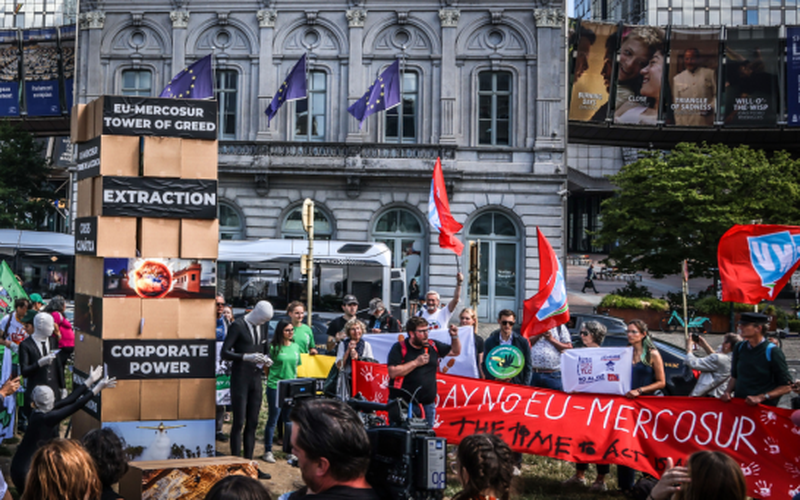EU-Mercosur threatens people’s right, the planet & democracy
Toutes les versions de cet article : [English] [français]
Friends of the Earth Europe | 6 December 2024
EU-Mercosur threatens people’s right, the planet & democracy
After more than 20 years of secretive negotiations, an agreement has been announced on the EU-Mercosur free-trade deal. Yet the deal’s future still remains in doubt due to the political context : countries like France and Poland opposing the deal, dangerous far-right leadership in both blocs – Argentinian climate-denier President Milei to assume Mercosur presidency by December 2024, and growing social movement pressure. Deemed a harmful deal for people and the planet, it will continue to face strong resistance in the ratification process.
Friends of the Earth International remains steadfast in its opposition to the current EU-Mercosur free-trade deal as it will transfer enormous powers to transnational corporations, and undermine peoples’ fundamental rights to work, food, an ecologically sound environment and safe climate.
According to Julie Zalcman, trade campaigner at Friends of the Earth Europe :
“EU-Mercosur is an outdated deal, set to fuel the climate and biodiversity crisis while weakening peoples’ right to healthy, local and fair food. The negotiations were conducted in complete secrecy despite the massive outcry from farmers and the clear opposition of several European governments and Parliament.
Any attempt to fast-track the ratification process by splitting the deal, will be nothing less than an undemocratic power grab. We urgently need trade policies that prioritise climate, justice and cooperation over greed.”
Lucia Ortiz, executive board member of Friends of the Earth Brazil and Friends of the Earth Latin America and Caribbean, continued :
“The failure of neoliberalism was acknowledged by the Brazilian Presidency of G20 at the Rio de Janeiro summit in November. Its policies and instruments, such as Free Trade Agreements, jeopardise democracies, as they limit the ability of sovereign states to define social and development policies for decades to come.
While advancing the rights of transnational corporations and financial institutions to profit from privatisation of public services to public procurement, the EU-Mercosur deal perpetuates the colonial asymmetries. Relegating South American economies to raw materials providers, it concentrates even more political and economic power on a few big companies in the mining and agribusiness sectors.”






